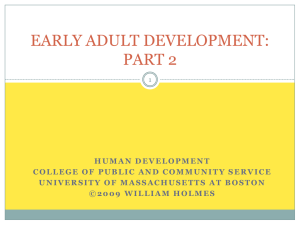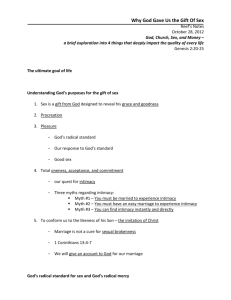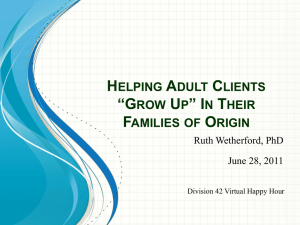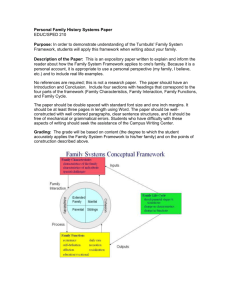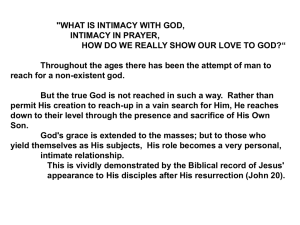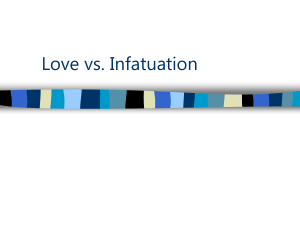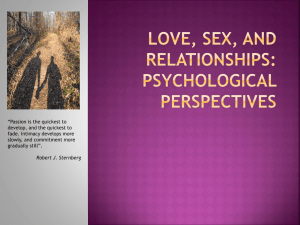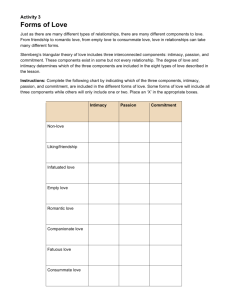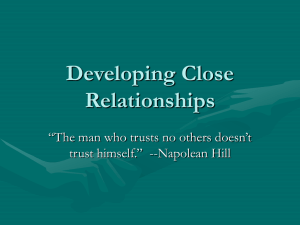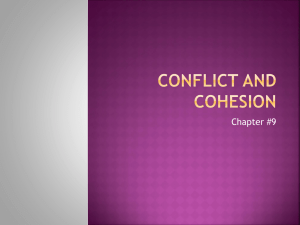Lesson 2 - One Flesh Ministries
advertisement
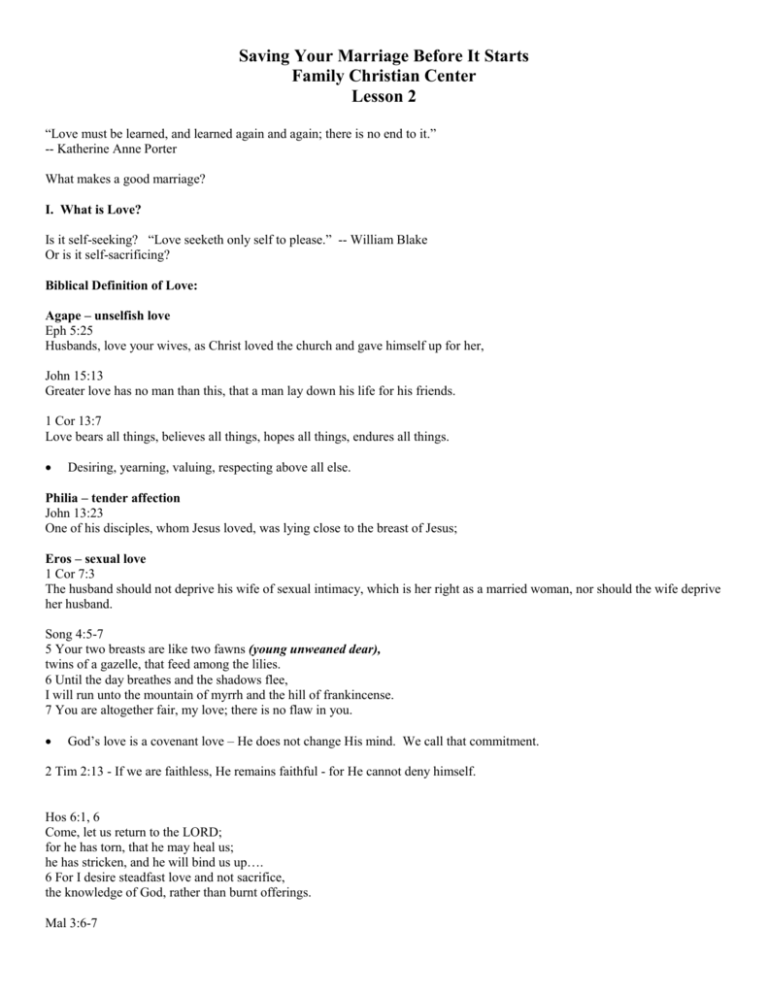
Saving Your Marriage Before It Starts Family Christian Center Lesson 2 “Love must be learned, and learned again and again; there is no end to it.” -- Katherine Anne Porter What makes a good marriage? I. What is Love? Is it self-seeking? “Love seeketh only self to please.” -- William Blake Or is it self-sacrificing? Biblical Definition of Love: Agape – unselfish love Eph 5:25 Husbands, love your wives, as Christ loved the church and gave himself up for her, John 15:13 Greater love has no man than this, that a man lay down his life for his friends. 1 Cor 13:7 Love bears all things, believes all things, hopes all things, endures all things. Desiring, yearning, valuing, respecting above all else. Philia – tender affection John 13:23 One of his disciples, whom Jesus loved, was lying close to the breast of Jesus; Eros – sexual love 1 Cor 7:3 The husband should not deprive his wife of sexual intimacy, which is her right as a married woman, nor should the wife deprive her husband. Song 4:5-7 5 Your two breasts are like two fawns (young unweaned dear), twins of a gazelle, that feed among the lilies. 6 Until the day breathes and the shadows flee, I will run unto the mountain of myrrh and the hill of frankincense. 7 You are altogether fair, my love; there is no flaw in you. God’s love is a covenant love – He does not change His mind. We call that commitment. 2 Tim 2:13 - If we are faithless, He remains faithful - for He cannot deny himself. Hos 6:1, 6 Come, let us return to the LORD; for he has torn, that he may heal us; he has stricken, and he will bind us up…. 6 For I desire steadfast love and not sacrifice, the knowledge of God, rather than burnt offerings. Mal 3:6-7 6 "For I the LORD do not change; therefore you, O sons of Jacob, are not consumed. 7 From the days of your fathers you have turned aside from my statutes and have not kept them. Return to me, and I will return to you, says the LORD of hosts. Thus love is a choice to seek the highest good of the one loved, no matter what. Can involve a mixture of opposites: affection and anger, excitement and boredom, stability and change, restriction and freedom. Many Americans wonder whether they have “fallen out of love.” A differing notion of marriage enables arranged marriages in the Orient to succeed! So what is success? Your love in marriage looking like God’s love for you. Robert Sternberg’s Triangular Model of Married Love 1. Passion – the motivational side of the triangle, the spine-tingling sensation that moves us toward romance. Passion is sensual and sexual, characterized by physiological arousal and an intense desire for physical affection. Song 1:2 O that you would kiss me with the kisses of your mouth ! For your love is better than wine, Passion can be possessive and even obsessive, to where couples can’t bear to be apart from one another. Pure passion is self-seeking until linked with intimacy. 2. The relational side of love’s triangle is intimacy. Love without intimacy is only a hormonal illusion. One cannot desire another person over the long haul without really knowing that person. Intimacy has a “best friend” or “soul mate” quality about it. We all want someone who knows us better than anyone else, who accepts us just as we are. We want someone who holds nothing back from us, someone who trusts us with personal secrets. Intimacy fulfills our heart’s deepest longings for closeness and acceptance. Without careful nurture, intimacy withers. In Finding the Love of Your Life, Neil Clark Warren identifies lack of intimacy as the number one enemy of marriage. If two people do not know one another deeply, then can never merge or bond, becoming what the Bible calls “one flesh.” Without intimacy, Warren says “they will be isolated and alone, even while living under the same roof.” The fulfillment of love hinges on closeness, sharing, communication, honesty, and support. What destroys intimacy? Judgment. Advice-giving. Condescension. We all yearn for unconditional acceptance. 3. The cognitive and willful side of the love triangle is commitment. We choose to be committed, to remain faithful, to do our best, no matter what. “Till death do us part.” Mal 2:15-16 Take heed to yourselves, and let none be faithless to the wife of his youth. 16 For I hate divorce, says the LORD the God of Israel. Commitment says, “I love you because you are you [KNOWledge], not because of what you do or how you make me feel.” The Swiss counselor Paul Tournier describes the marriage vow as a gift: “total, definite, unreserved, . . . a personal and unchangeable commitment.” The longevity of love and the health of a marriage depend mightily on the strength of commitment. The side of the love triangle may vary with time. Passion at first may be very strong; intimacy may grow with time. Larger amounts of intimacy, passion, and commitment yield a large triangle! Long term, sides of the triangle should be equal and in balance. Out of balance types of love: 1) companionable – friendship without passion 2) foolish – passion without intimacy Sternberg calls balanced, mature love consummate love. Consummate love is the goal toward which every marriage strives. Maintaining consummate love is where many marriages falter. Attaining consummate love is like reaching your goal in a weight-loss program. Love styles in marriage change – certain elements become more important for different spouses at different times. II. Love Styles A couple may feel that they have “fallen out of love” if they have differing love styles or love languages. Love style and needs may change over time, or in response to differing circumstances in life, such as school or children. Gary Chapman, The Five Love Languages: 1. Words of Affirmation 2. Receiving Gifts 3. Quality Time 4. Acts of Service 5. Physical Touch Check out www.fivelovelanguages.com! What is your dominant love language? Your partners? Quick Exercise—list the order of importance of your fiancée’ love style(language) III. Love’s Stages The love you now have for your partner will undergo numerous changes and evolve into many different forms over a lifetime together. Accepting this fact can help you keep your love alive, saving your marriage before it starts.” – Les and Leslie Parrott We learn to enjoy and appreciate love’s seasons and stages. Every marriage faces pressure points: getting adjusted to one another, launching a new career, birth of a first child, children going to school, moving away, serious illness, retirement. Stage One: Romance When couples nearly forget they are unique individuals with separate identities, taking complete delight in each other. Reaching toward one another to fulfill their deepest needs for intimacy, they experience a kind of mystical, ecstatic union. Song 4:9-10 9 You have ravished my heart , my sister, my bride, you have ravished my heart with a glance of your eyes, with one jewel of your necklace. 10 How sweet is your love, my sister, my bride! how much better is your love than wine . . . Stage Two: Power Struggle This stage is full of tension, uncertainty, and conflict. Begins when partners discover aspects of one another they didn’t know; differences in roles and expectations become glaring. Need for learning to adjust to each other’s ways, settling into mutually agreed power structures. 1 Cor 11:3 - But I want you to understand that the head of every man is Christ, the head of a woman is her husband , and the head of Christ is God. Eph 5:21 - Submit to one another out of reverence for Christ. Stage Three: Cooperation Sense of acceptance of one another as you really are, willingness to change. Dialogue and compromise happen. Realization that love is not so much about looking outward at each other as it is about looking inward, taking responsibility for their own problems and change. Relinquishing the illusion that their partner needs to make them happy. 1 Cor 13:4-7 4 Love is patient and kind; love is not jealous or boastful; 5 it is not arrogant or rude. Love does not insist on its own way; it is not irritable or resentful; 6 it does not rejoice at wrong, but rejoices in the right. 7 Love bears all things, believes all things, hopes all things, and endures all things. Stage Four: Mutuality Mature love is happening, with profound sense of unity, of covenant, of shared identity, being used to being married. Involves acceptance and unconditional love, focus on friendship and intimacy, shared life together. Matt 19:6 - So they are no longer two but one flesh. John 15:13 Greater love has no man than this that a man lay down his life for his friends. Stage Five: Co-creativity Enabling and releasing one another’s gifts and destiny. As partners mature, they develop a more pronounced energy of cocreativity. The rhythm of intimacy comes to a new and sustained level. Love overflows. Secure in themselves and in their love, couples have an abundant flow of energy for action in the world at large. Couples discover they are not just made for each other; they are called call to minister love to everyone. John 3:30 - He must increase , but I must decrease. IV. Making Love Last a Lifetime Live life on purpose: Gal 4:18 - For a good purpose it is always good to be made much of, James 5:11 - You have seen the purpose of the Lord, Acts 11:23 - He exhorted them all to remain faithful to the Lord with steadfast purpose; 1. Cultivate passion a. Practice meaningful touch. Affection in the form of touching is not only preliminary to making love, it is a language that speaks more eloquently than words. “Davy had crept near to me still crouching, and I put my arm about her, and she snuggled close. Neither of us spoke, not so much as a whispered word. We were together, we were close, we were overwhelmed by a great beauty. I know that it seemed to us both that we were completely one; we had no need to speak.” – Sheldon Van Auken, A Severe Mercy b. Plan mutually enjoyable experiences. Have dates! Romantic dinners, trips to the theatre, Christmas shopping in Chicago, tubing in Hawaii. c. Compliment your partner daily. Build them up in spirit. Increase their self-esteem. Your job is to release their true identity through encouragement. 1 Thess 5:11 - Therefore encourage one another and build one another up, just as you are doing. d. Make time/take time to have sex. e. Be sweet; don’t be irritable. Eph 4:32 - Be kind to one another , tenderhearted . . . James 1:20 - The anger of man does not work the righteousness of God. “To be loved, be lovable.” -- Ovid 2. Cultivate intimacy Ideally, husbands and wives are best friends as well as lovers, sharing dreams, interests, fears, and hopes. Unfortunately, only a small minority of couples experience genuine intimacy. Partners who don’t cultivate intimacy will at best, live in an “empty shell” marriage, focusing on practical details, but just living together under same roof. Some married people prefer to be intimate with close friends than with their spouses, sharing their innermost feelings with the girlfriends or with the guys……..WHY? Intimacy with the opposite sex not your spouse can lead to emotional adultery which can lead to physical adultery. Set a boundary. a. Spend time together. Talk to one another every day on purpose. One of the great illusions of our age is that love is self-sustaining. “Love must be fed and nurtured – first and foremost it demands time.” -- David Mace. Studies indicate that marital happiness is highly correlated with the amount of time spent together.” – Les and Leslie Parrott b. Truly listen, with your heart. Studies on intimacy show that not really listening is the most fundamental error couples make. Intimacy is cultivated when we patiently listen to the details of a story, and also to the feelings our spouses are conveying, without judgment. c. Practice unconditional acceptance. The deepest kind of sharing can take place only when there’s no fear of judgment or rejection. Husbands, don’t try to “fix” your wife’s problem. She just wants somebody to feel it with her. d. Focus on commonalities, not on differences. You give life to whatever you speak to. e. Discuss spiritual truth together. Experiences from life, Bible study, the word at church . . . What do you do in your relationship to cultivate intimacy? What else can you do, especially when you are busy? 3. Cultivate commitment a. Assess the high value of commitment. “I can’t emphasize enough the importance of commitment in sustaining life-long love. A study of 6000 marriages and 3000 divorces concluded that there is nothing more important in a marriage than a determination that it shall persist. With such a determination, individuals force themselves to adjust and accept situations which would seem sufficient grounds for breakup.” – Les and Leslie Parrott b. Meet your partner’s needs. Even when tired. One of the best ways to give your partner security in your marriage is by meeting as many of their day-to-day needs as possible. c. Value your partner’s vow and covenant, their love. They are laying down their lives for you. d. Make your commitment part of your being, who you are. As human beings, we create and define ourselves through what we believe and what we commit to – those commitments become an integral part of our identity. When we contradict our commitments, we lose ourselves; we are not true to who we are. Do you think there are times in marriage when commitment runs thin? If so, when and what can be done to prevent it? NOTES:
